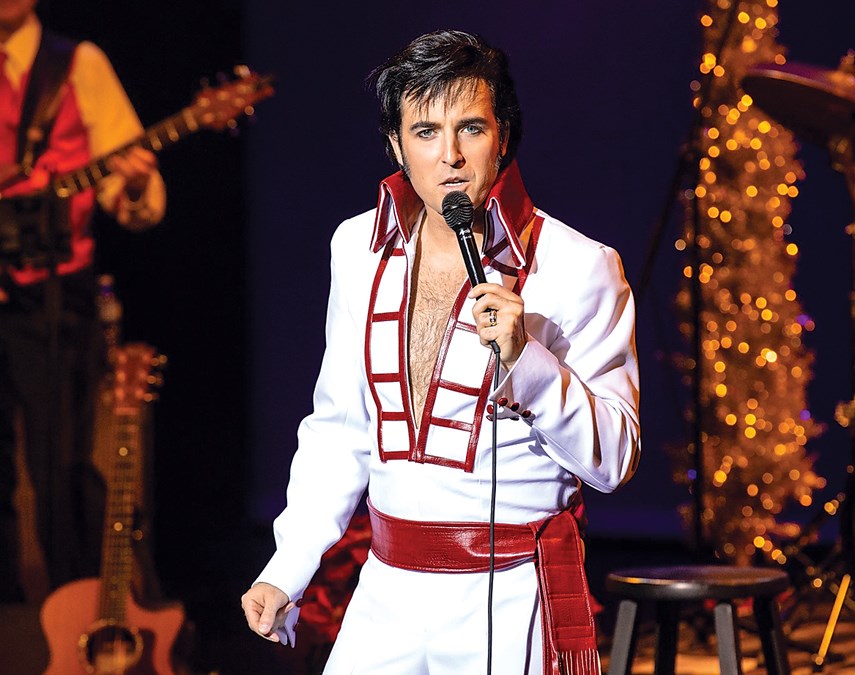Elvis: A Christmas Special featuring Pete Paquette and Amberley Beatty, Centennial Theatre, Saturday, Dec. 1. Tickets available at .
âItâs very hard to live up to an image.â â Elvis Presley, 1972
It was like he slipped out the back door and Elvis strolled in the front.
Pete Paquette grew up in Eastern Ontario. His accent, however, regularly skips into Quebec, turning âthâ into âdâ sounds. But when he sings a snippet of âI Canât Stop Loving You,â 400 years of French Canadian history from Samuel de Champlain to Patrice Bergeron vanish from his voice, replaced by the Tupelo tenor of Elvis Aaron Presley.
Recuperating from a nasty cold, Paquette is on his last day of rest before bringing his 10-piece show band out west for Elvis: A Christmas Special.
âItâs our first time flying everybody out,â Paquette remarks. âWeâve never done our Christmas show, ever, outside of Ontario.â
The show is slated to boast backup singers, three horn players and the âchameleonâ country singer Amberley Beatty, a songstress who regularly performs Connie Francis, Patsy Cline, Shania Twain, and as herself.
âWe call her Canadaâs tribute queen,â Paquette says.
The centrepiece of the Elvis Christmas show is Paquette, who jokes, jumps and gyrates as the rockabilly cat himself.
Paquetteâs love for the king goes back to a boyhood viewing of the Elvis â68 Comeback Special.
Between 1960 and â67 Presley had pumped out about one movie every four months â culminating in a regrettable scene in which the conduit for generations of black artistry crooned âOld Macdonald Had a Farmâ in the flatbed of a pickup truck crammed with chickens.
The comeback special, Paquette explains, âenabled us to see Elvis in his true form as a rock ânâ roll star.â
It was before Las Vegas showrooms and the smorgasbord of uppers and downers that tragically cut Presleyâs life short.
Writing for the New York Review of Books, Luc Sante described Elvis as a âcharged presence, the manifestation of ticklish ambiguities of sex and race that cannot fail to provoke.â
For Paquette, the â68 special was as provocative as anything heâd seen.
âElvis was still discovering who he was,â Paquette says.
But if the show represented self-discovery for Presley, it marked self-realization for Paquette.
He wanted to sing like Elvis.
It wasnât long before he was curling his lip and imitating Elvis for his classmates.
âAt any grade level that I did it, they would always appreciate it and really get a kick out of it,â he says.
As a part-time teacher in Toronto he still breaks out the occasional impression for students.
Describing the impact of Elvis shortly after his death, biographer Dave Marsh wrote: âthe new religion that seems destined to form around his persona and the best of his works had yet to take shape.â
Paquette was educated in one branch of that religion at a series of jumpsuit-filled, competitive Presley impersonator festivals.
That time on stage was invaluable for developing his voice and stage presence.
Like parents waiting for their child will grow into an extra-large snowsuit or a coach hoping his first baseman grows a couple inches before opening day, Paquette watched himself grow â hoping heâd fill Presleyâs blue suede shoes.
âYouâre always wondering if itâll change toward resembling a little bit of Elvis,â he says. âWhen I hit my late 30s, my voice became much stronger and much more mature and it does sound more like Elvis than it ever did.â
But while heâs able to embody Elvis in tone and timbre, Paquette draws a line between an impression and a tribute.
An impressionist chases every Elvis mannerism and tic, even at the expense of the music. The tribute artist, Paquette explains, values making great music in the style of Elvis over photo-realistic accuracy.
âIf I have some kind of subtle differences then thatâs fine to me as long as itâs good to hear,â he says.
Following Presleyâs death, impersonator Artie Mentz was once quoted as saying: âNow itâs sort of like being a duplicate without an original.â
But Paquette argues there can still be authenticity within the impression.
âCreating a more natural performance is more fulfilling and much more accepted by the audience than to try to mimic,â he says. âItâs all about being as natural as possible â but performing like Elvis.â
In his book Careless Love, music critic Peter Guralnick described Presleyâs ambition to âencompass every strand of the American musical tradition.â
That ambition is evident in Paquetteâs song choices. He plans to wail through Presleyâs White and Blue Christmas albums, singing âBlue Christmas,â âHere Comes Santa Claus,â and âSanta Claus is Back in Town.â But the show is also set to feature traditional Christmas carols and âsongs of inspiration,â including Leonard Cohenâs âHallelujah.â
âThatâs a song that we believe Elvis would have done,â Paquette says.
The question of what Elvis would have done is something Paquette has been pondering since he was 10 years old. But what matters more than anything, he says, is how the songs sound.
âMusic hits everybody in a good way.â


